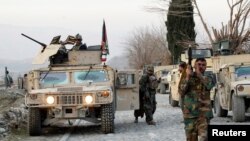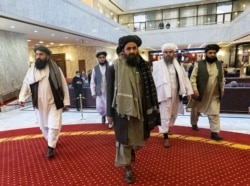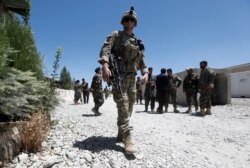U.S. President Joe Biden admitted Thursday that some 2,500 U.S. troops could still be in Afghanistan after May 1, the agreed upon deadline for American forces to leave the country under a year-old deal with the Taliban.
"It's going to be hard to meet the May 1 deadline," Biden told reporters during a White House news conference, his first as president.
Biden cited "tactical reasons" for the possible delay but said that even if the United States does not meet the deadline, he could not envision U.S. troops staying in Afghanistan past next year.
"I can't picture that being the case," he said. "It is not my intention to stay there for a long time."
"The question is how and under what circumstances do we meet that agreement that was made by President (Donald) Trump to leave under a deal that looks like it's not being able to be worked out to begin with," he said.
Biden initiated a review of the February 2020 deal between the administration of former president Trump and the Taliban shortly after he took office. And while that review has yet to be formally completed, several high-ranking officials have questioned whether the Taliban have kept their side of the bargain.
"It's clear that the Taliban have not upheld what they said they would do and reduce the violence," Gen. Richard Clarke, the commander of all U.S. special forces, told U.S. lawmakers earlier Thursday. "It is clear they took a deliberate approach and increased their violence since the peace accords were signed."
U.S.-Taliban deal
Other officials have likewise questioned the Taliban's commitment to ensure that Afghanistan does not again become a base of operations for groups like al-Qaida, many pointing to evidence that Taliban leadership has yet to sever ties with the terror organization.
Despite such public misgivings from U.S. officials about the deal, Taliban officials are insisting Washington honor the agreement as is.
"It is clearly stated in the agreement that America will withdraw all its troops (from Afghanistan) by May 1, and we again ask them to strictly adhere to the mutually agreed deadline," Taliban spokesman Zabihullah Mujahid told VOA earlier this week.
"In case Americans do not meet their obligations and abandon the agreement, the Islamic Emirate (Taliban) will be forced to defend their nation and consider all other options to force foreign troops out of the country," Mujahid said, without elaborating.
Talk that the Biden administration would try to extend the May 1 deadline for the withdrawal of U.S. forces from Afghanistan has been gaining momentum in recent weeks.
On Wednesday, the chairman of the House Armed Services Committee, Democrat Adam Smith, told a Foreign Policy virtual discussion that based on his discussions with the White House and the Pentagon, "There's a general feeling that May 1 is too soon."
"Running for the exits pell-mell by May 1 is dangerous," he said calling it a matter of logistics. "I don't want to leave a bunch of high-grade military equipment behind for whoever grabs either."
U.S. withdrawal
Should the U.S. decide to pull out by the deadline, some 7,000 NATO forces would also leave.
"We went in together, we have adjusted together and when the time is right, we will leave together," U.S. Secretary of State Antony Blinken told reports earlier this week in Brussels, during a meeting of NATO foreign ministers.
"Tactical decisions aside, we are united with our NATO allies in seeking to bring a responsible end to this conflict and to remove our troops from harm's way just as we are collectively determined to ensure that Afghanistan never again becomes a safe haven for terrorists who could threaten the United States or our allies," he added.
U.S. military and defense officials, however, continue to raise concerns.
Clarke, the commander of U.S. Special Operations Command, warned lawmakers Thursday that the current government in Afghanistan could fall and that its security forces could be overrun by the Taliban should U.S. troops leave.
"While progress has been made … the capabilities that the U.S. provides for the Afghans to be able to combat the Taliban and other threats that reside in Afghanistan are critical to their success," Clarke told the Senate Armed Services Committee, noting he had traveled to Afghanistan recently to meet with the head of the Afghan military's new joint, special operations command.
Earlier this month, a U.S. government watchdog similarly warned that U.S. and international efforts to build a strong and stable Afghanistan "may turn out to be a bridge too far."
"It may not be an overstatement that if foreign assistance is withdrawn and peace negotiations fail, Taliban forces could be at the gates of Kabul in short order," said John Sopko, the Special Inspector General for Afghanistan Reconstruction (SIGAR).
Sopko also cautioned that it is not just the withdrawal of U.S. and NATO forces that could cripple the Afghan government. He said the departure of approximately 18,000 contractors and trainers, also required under the U.S.-Taliban deal, would be even more devastating.
"The Afghan government relies heavily on these foreign contractors and trainers to function," Sopko said. "No Afghan air frame can be sustained as combat effective for more than a few months in the absence of contractor support."
VOA's Ayaz Gul in Islamabad contributed to this report.










